Welcome to the week. Here are the most notable stories our writers and readers have come across in the past seven days…
But wait, we want to give a special thanks to our new sponsor, Cyclepath PDX, a great local bike shop that is ready to welcome the entire community to their location on NE Martin Luther King Jr. Blvd and Brazee.
And now, your roundup…
The Austin Killips debate: Killips is a bicycle racer who recently became the first transgender person to win a major UCI race, an accomplishment that she relishes, but that also re-fueled a heated debate over competitive cycling and gender. (Cycling News)
How to save lives: If cities are serious about reducing vehicle speeds they should start with their own fleets and use readily available Intelligent Speed Assist technology. (Streetsblog)
The case for place: This one is from 2021 but it jibes so well with the recent opinion I shared about how transforming our streets and public spaces could help revitalize our city, that I think it’s worth sharing. (Brookings)
Not everyone drives: Big news for our friends at the Disability Mobility Initiative, who’ve partnered with America Walks to take their Week Without Driving program national. (America Walks)
About equity: Portlanders could benefit from a more open conversation about how best to make sure our projects and policies reach equitable outcomes because right now it’s often a war of words where neither side is making progress. (Vox)
News by bike: Here’s one that’s very close to my heart: Two BBC journalists have created a mobile news station on a cargo bike and dubbed it the “Bike Bureau”. (BBC)
Covered bike path: It’s truly a win-win-win-win when you provide cover for a bike path and the cover is made of solar panels like this new one in Germany. (Electrek)
Historic bicycles: There is such an interesting history around bicycle designs and inventions that I’m always keen to share a story about a vintage bike collection. (CBC)
Thanks to everyone who shared links this week.



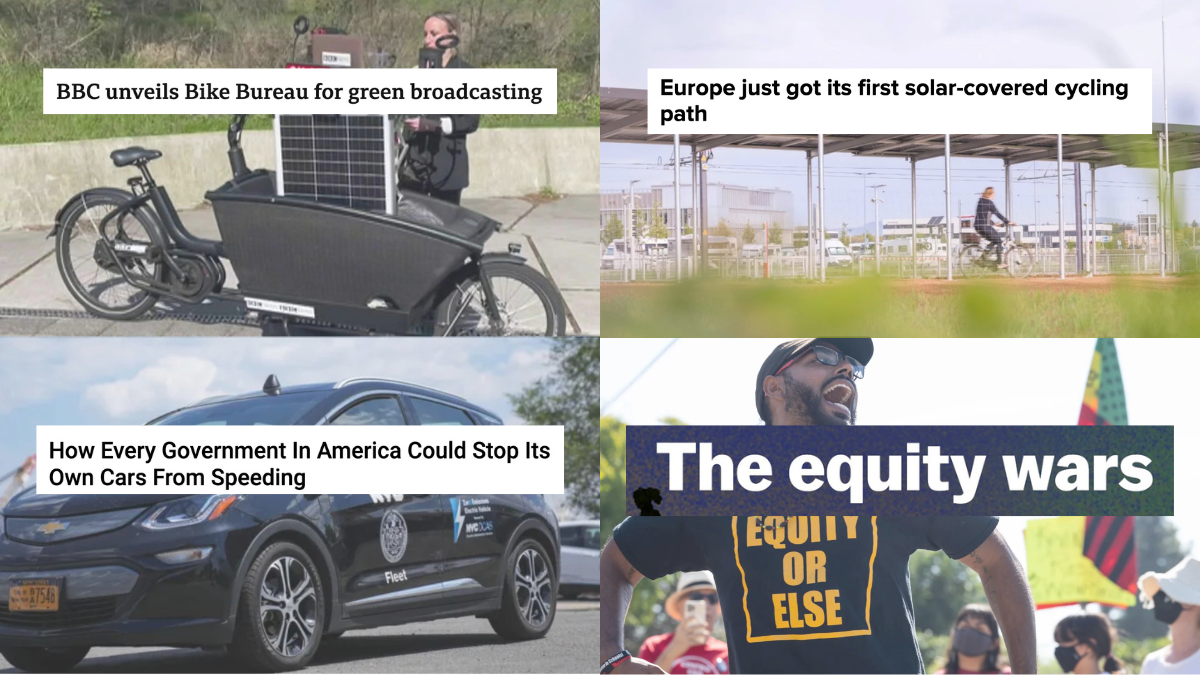
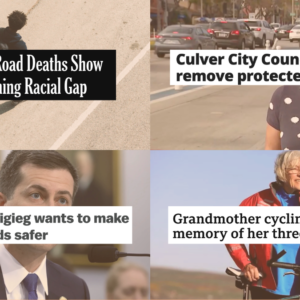
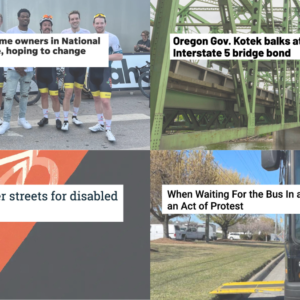
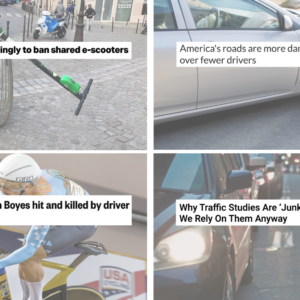
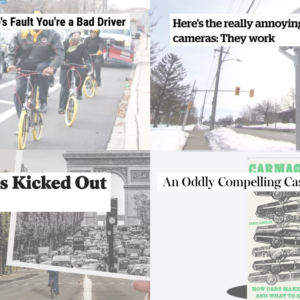
Thanks for reading.
BikePortland has served this community with independent community journalism since 2005. We rely on subscriptions from readers like you to survive. Your financial support is vital in keeping this valuable resource alive and well.
Please subscribe today to strengthen and expand our work.
Regarding the Killips article, not really debating whether Trans people should be allowed to race or not, but Killips cites Molly Cameron as a ground breaker when in fact Molly always raced in the gender (male category) that she was born so Killips is being pretty disingenuous about that comparison.
what if Killips gets inspiration from Molly for the many things that Molly does for the cycling and transgender issues in general? What if just the racing part is just one small part of what Molly is doing?
I was not disparaging Molly in the least FFS.
I was just pointing out they are not doing the same thing.
Molly would have completely dominated the women’s field which is why this is a troubling issue.
Jonathn, dont you know any open honest conversations about equity and equality aren’t allowed in Portland, which has become a very intolerant and close minded place. The culture here is anything but the classic defintion of liberal thought. The Kendi anit-racists will jump out of the woodwork to shut down the discussion with calls of “Racism!” for anyt belief that anything but race is the sole cause of differences amongst us.
Yeah I know there’s a lot of intolerance around here in terms of how we talk about these sensitive issues, but unlike what it appears you are doing, I’d rather try and change things I don’t like by opening up my platform to them, keeping an open mind, giving folks the benefit of the doubt, and pushing things in a productive and positive way, instead of incessantly shitposting about the city I still live in and still love.
Is raising awareness of intolerance in Portland now considered “shitposting”? It’s not easy being tolerant is it?
PS I live in Portland as well but it’s no longer a city I love. I’m not alone in that opinion.
No. I’m referring to people who only post things about how terrible Portland is to the point where it sounds like they’re bots and I think it often reaches a point where that type of posting does more harm then good. I’m saying that in my opinion it’s not my favorite way of raising awareness. Also, before you try and call me out for being intolerant, stop and realize that I’ve allowed 100s (1000s??) of those type of comments to be posted here over the year.
P.S. I have lost a lot of love for my city too! I’m extremely frustrated by how shitty of a job our leaders have done and that we have made such little progress on big problems.
RE More equitable outcomes… I don’t even know what this means in the transportation context. How do we evaluate whether, say, the removal of traffic calming on NE 7th had equitable outcomes? How will we judge the equity of outcomes on SW Capitol Highway? Without specific metrics, the whole concept doesn’t make much sense to me.
You just need to hire an army of equity consultants. Just don’t question their qualifications or methodology.
While I enjoy a snarky answer as much as the next person, I think this question is something those who think finding equity in transportation projects is a meaningful exercise need to answer for every project.
It means prioritizing transportation funding for intentionally-neglected neighborhoods where people of color tend to live.
“the study found that travel distances vary among racial/ethnic groups when walking, cycling, or driving—and when these differences in activity levels are taken into account, Black Americans had the highest traffic fatality rate per mile traveled and across all modes, followed by Hispanics, Whites, and Asians. These disparities were particularly stark for walking and cycling, and during evening hours.”
https://www.hsph.harvard.edu/news/press-releases/racial-disparities-traffic-fatalities/
It sounds like you see equity primarily through a safety lens. One way to reduce bad outcomes is to enforce rules against dangerous driving. Would you advocate more traffic enforcement in areas with higher crash rates to improve equity?
Also, since (presumably) Capitol Highway serves a slightly more white population than exists in some parts of E Portland, making that safer worsens equity, so we shouldn’t do it (doing something there means we’re not doing it elsewhere). Is that the kind of argument you’d make?
These are all quotes from a recent NY Times article on equity and street safety. The thrust of the piece is the horrific toll racism in planning has taken on minority communities, and the need to fix that, NOW. https://www.nytimes.com/interactive/2023/04/26/opinion/road-deaths-racial-gap.html
No argument from me.
However, I think viewing these statements ONLY through a DEI lens does us all a disservice. Don’t we all deserve a society that embodies these concepts? Don’t we ALL deserve a PBOT that understands what Buttigieg is talking about?
FIX the inequity. But don’t use it as an excuse to fail elsewhere.
The ESRI podcast ‘Science of Where’ interviews head GIS analyst from NAACP , is the best description of equity in real life from one of the most important racial groups in the country. How are we actually helping these communities that exist on a map with historic issues? How to get to solutions that matter to these historic communities. Right now we need something to happen at the Rose Quarter, nothing is not an option.
https://www.esri.com/about/newsroom/podcast/how-the-naacp-uses-maps-and-data-science-to-further-racial-equity/
Thanks for your comment, Roberta. There is an awful lot of “sealioning” about racial and class-based equity in this thread. And it seems to me that this attempt to complicate and muddy the waters of such a simple and clear moral issue is an example of the right-wing tactic of claiming that a problem is just too complex or inevitable so its best to do nothing.
The Rose Quarter is now full of people from less important racial groups. I have no problem investing in the area, but it’s not going to primarily benefit the people who were living there when I-5 was built (most of whom, unless they were children, are probably no longer living).
It seems the racial equity argument in Portland has lost all meaning. It’s basically morphed into a way to squash any dissent to one’s project or opposition to a project...if you oppose their determination of “equity” or “anti-racism” then you’re a racist. Look at the justification by Hardesty/PBOT that installing Protected Bike Lanes (PBL’s) on Hawthorne did not align with racial equity goals. What a joke. There may have been other reasons against PBL’s but attempting to justify not supporting PBL’s on the basis of racism is a troublesome manipulation of “equity”. Therefore I just now discount any claims of racism when it comes to local governmental projects. It’s typically a bunch of baloney.
I guess you are crying no tears over how this project has negatively trimet line 14. How “cyclist” of you….
Which project are you referring to?
The lane reduction on Hawthorne. It has caused traffic congestion that has markedly slowed down trimet line 14. Instead of removing two lanes they should have been converted to rose lanes.
No worries, they can just remove a bunch of stops like they did when they reduced Foster. Gotta keep all those SOVs moving!